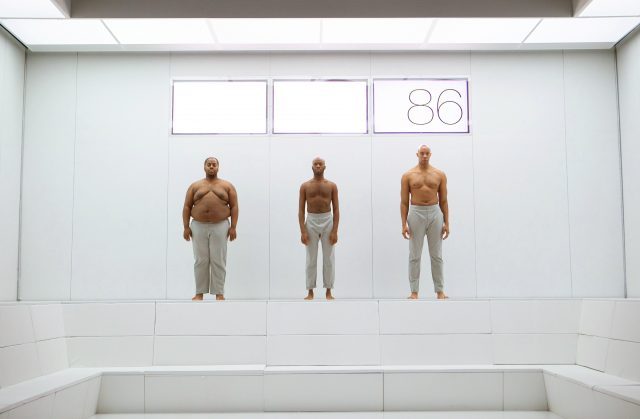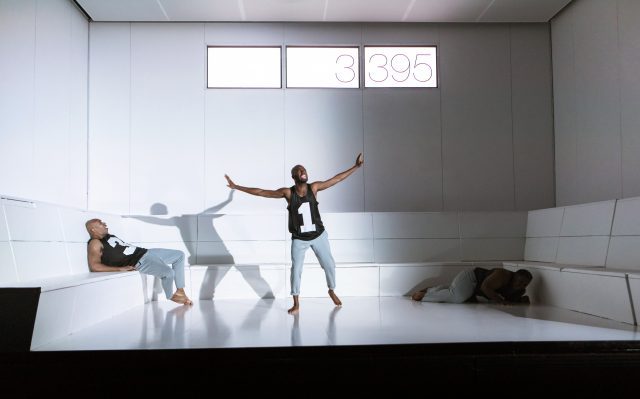
Edward Mawere, Leland Fowler, and Jamyl Dobson star in Donja R. Love’s New Group world premiere, one in two (photo by Monique Carboni)
The New Group at the Pershing Square Signature Center
The Alice Griffin Jewel Box Theatre
480 West 42nd St. between between Ninth & Tenth Aves.
Through January 12, $33-$63
thenewgroup.org
Donja R. Love’s one in two presents the human side of numbers and elements of chance that are staggering: According to the CDC, fifty percent of queer and bisexual black men will contract HIV. Yes, one in two. The eighty-five-minute New Group world premiere takes place on Arnulfo Maldonado’s brilliant set, a blindingly white otherworldly waiting room that wittily morphs into a bar, a bedroom, a hospital room, and other locations. At the top of the back wall, three windowlike panels display numbers that move sequentially, reminiscent of the countdown clock in Lost, except here they go up, tallying the HIV toll second by second. But Love, who wrote the play in his notes app as he approached the tenth anniversary of his testing positive — and “experiencing suicidal ideations,” he explains in a program pamphlet — has not created a somber melodrama about disease. Instead, under the superbly inventive direction of Stevie Walker-Webb, one in two is as funny as it is serious, making its points in complex, intricate scenes filled with humor and intelligence.
As you enter the Alice Griffin Jewel Box Theatre at the Pershing Square Signature Center, there are three shirtless men onstage, lounging about as if in a sauna that is not quite right. They take numbers from a ticket dispenser and then play Rock Paper Scissors to determine who will be #1, #2, and #3. (The actors have to know the lines for each character, since their part could change from one night to the next, the chances one in three.) At the show I saw, Leland Fowler was #1, who becomes Donté Hart, a young man who has just learned that he has HIV and the only character to have an actual name. Edward Mawere was #2, and Jamyl Dobson #3; they both play multiple roles, including a nurse, a bartender, Donté’s mother, Kinda Ex-Boyfriend, Married Man at the Center, Trade Hung Like Horse Underscore 99, and Man of Your Dreams. Fowler, Mawere, and Dobson have an intoxicating camaraderie that is a joy to watch, perhaps because each one so well understands the other men’s roles, since they have played them numerous times as well.

#1 (Leland Fowler) gesticulates wildly while facing a positive diagnosis in brilliantly realized play at the Signature (photo by Monique Carboni)
The trio goes back and forth in time, performing key moments from Donté’s life, fully aware that they are play-acting, occasionally breaking away to express their displeasure about what is happening onstage. “I don’t want to be the mom,” #3 says as a scene ends with him as the nurse. “If you don’t have to then neither, neither do I,” #2 replies. “Well, somebody’s gotta do it,” #1 argues. The one who becomes the mom puts on a colorful flowing wrap that is turned inside out for another role, the name of which can’t be printed here. (Andy Jean’s costumes also feature black T-shirts with the numbers 1, 2, and 3 on them to help identify who’s who.) The play has a powerful conclusion that resonates deeply; Love (Sugar in Our Wounds, Fireflies) and Walker-Webb (Ain’t No Mo’) avoid proselytizing and are not seeking sympathy; instead, they have an important narrative to share, and they do so with great skill and compassion while breaking through theatrical conventions. “I’m not just a number. I’m flesh. I’m blood. I feel,” #1 says early on. He’s not just a number, and as the play demonstrates, he might be number one, but his positivity affects so many others in his life. As Love writes in the pamphlet, one in two is “the story of a community — a community that’s in a hidden state of emergency.”